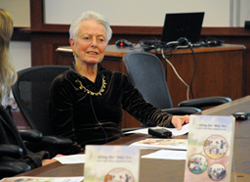An Unexpected Life Helping the World
An alumna's quest to do good
An alumna’s quest to do good
Nearly 40 years ago, after her children had left home, Jane Boorstein went to hear the economist Robert Theobold speak about the world’s grim environmental future. Afterward, when she asked Theobold what she could do to help, his cryptic reply—“You’ll have to figure that out for yourself”—sparked an epic quest: how might she become an agent of change in the world?
As it turns out, Boorstein, who received her master’s degree from Teachers College in 19XX, had no problem finding her way. In October, she told a rapt audience at TC’s Gottesman Libraries about “Learning Our Way Out,” a family planning project she developed and implemented in rural Ethiopia with the International Institute of Rural Reconstruction (IIRR).
Boorstein got the idea for the program—which is the focus of a just published book, Learning Our Way Out: Innovation for Family Planning and Reproductive Health (IRR, 2010)—during a trip to Kenya in 1971. While there, she visited a game park and learned that the animals were gradually being crowded out by the growing human population. She also spoke with a local woman who explained that many men, including her husband, had multiple wives, producing more children than the community’s resources could handle.
With a USAID grant, Boorstein began working with Catholic agencies that were willing to countenance discussion of birth control. She traveled all over the world, including the Philippines, sub-Saharan Africa and Bucharest, where she attended the World Population conference, and became convinced that the people who were the focus of such efforts should be the ones to make the decisions affecting their own lives.
“In developing countries, you can’t just introduce contraceptives—people need to address their basic needs first, like having food and a roof over their heads,” Boorstein explained.
By the late ’80s, Boorstein realized she needed an advanced degree to give her work more credibility. Despite worrying that she was “too old to go back to school,” she applied and was accepted to TC’s master’s program in Family Planning. She took Ray McDermott’s course in fieldwork in Families and Community Education and eventually wrote a thesis titled “Design for US Population Growth and Poverty: Aid to Families with Dependent Children.”
After graduating, Boorstein turned her focus back overseas. At the invitation of then-TC President Arthur Levine, she established the Partnership for Sustainable Families and Communities at Teachers College as a way to gain funding for her program in Ethiopia.
“Here was this very well put together alum, telling us about spending months in Ethiopia, sleeping on the ground,” recalled TC Associate Vice Provost Katie Embree, who helped Boorstein establish the program, which has since concluded. “There was a lot more she said about the program, and I listened, but I really was fixated on the floor-sleeping. All I could think was, What an amazing person.”
Back in Ethiopia, Boorstein got to work, employing an approach she calls “mutual learning.”
“I tried to get people to bring questions, to ask questions,” she said.
In concert with the IIRR, she applied to the Gates Foundation, whose support facilitated the implementation of Learning Our Way Out in 15 villages. Ultimately the program reached an estimated 90,000 people and touched upon not only family planning, but also micro-financing. The goal was partly to help community members learn different ways to earn money, Boorstein said population control was still the underlying focus: “We wanted people realize the connection between poverty and the number of children they have.”
Published Monday, Dec. 20, 2010
